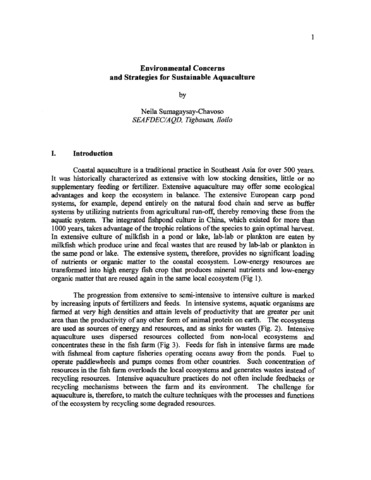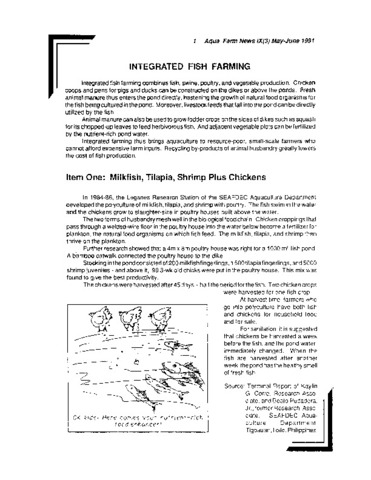Households, agriculture, industry, fishing, and fish farming along Imbang River, Negros Occidental
- Global styles
- MLA
- Vancouver
- Elsevier - Harvard
- APA
- Help

View/
Date
2007Author
Page views
3,879ASFA keyword
AGROVOC keyword
Metadata
Show full item record
Share
Abstract
Interviews were conducted among respondents identified from the households, agriculture farms, sugar mills, and fish farms along the whole stretch of Imbang River, Malisbog River, and Muyao Creek, down to Barangay Balaring at the coast of Silay City in Negros Occidental. Among the 1,073 households, 11% used river water for washing clothes, but 20% also used the rivers for disposal of waste waters, 11% for human wastes, and 13% for animal wastes. Among the 30 respondents from the agriculture sector, 70% discharged water into the river. The two sugar mills in the area treated waste waters partially before release into the rivers; one sugar mill also released wastes in a nearby rice field. Milling wastes such as bagasse, molasses, and mud press were reused and not dumped into the river. Imbang River was both the water source and wastewater sink for seven fish farms.
Suggested Citation
Sanares, R. C. (2008). Households, agriculture, industry, fishing, and fish farming along Imbang River, Negros Occidental. In T. U. Bagarinao (Ed.), Research Output of the Fisheries Sector Program (Vol. 2. Reports on Fisheries and Aquaculture, pp. 83-86). Quezon City, Philippines: Bureau of Agricultural Research, Department of Agriculture.
Type
Book chapterISBN
9718511776
Related items
Showing items related by title, author, creator and subject.
-
Environmental concerns and strategies for sustainable aquaculture
Sumagaysay-Chavoso, Neila (University of the Philippines Aquaculture Society, Inc, 2001) -
Domestic effluents and pollution in Imbang River, Negros Occidental
Gonzales, Guadiosa A. (Bureau of Agricultural Research, Department of Agriculture, 2007)Domestic effluents, or waste waters from human settlements, were sampled from eight stations along Imbang River in Negros Occidental from July 1993 to February 1995. Three types of domestic waste waters were produced by ... -
Integrated fish farming
Carreon-Lagoc, Julia; Southeast Asian Fisheries Development Center, Aquaculture Department (Aquaculture Department, Southeast Asian Fisheries Development Center, 1991)




